General
EfD-Mak Holds Policy Dialogue on L. Victoria’s Hydrology, Water Quality and Livelihoods
Published
5 years agoon
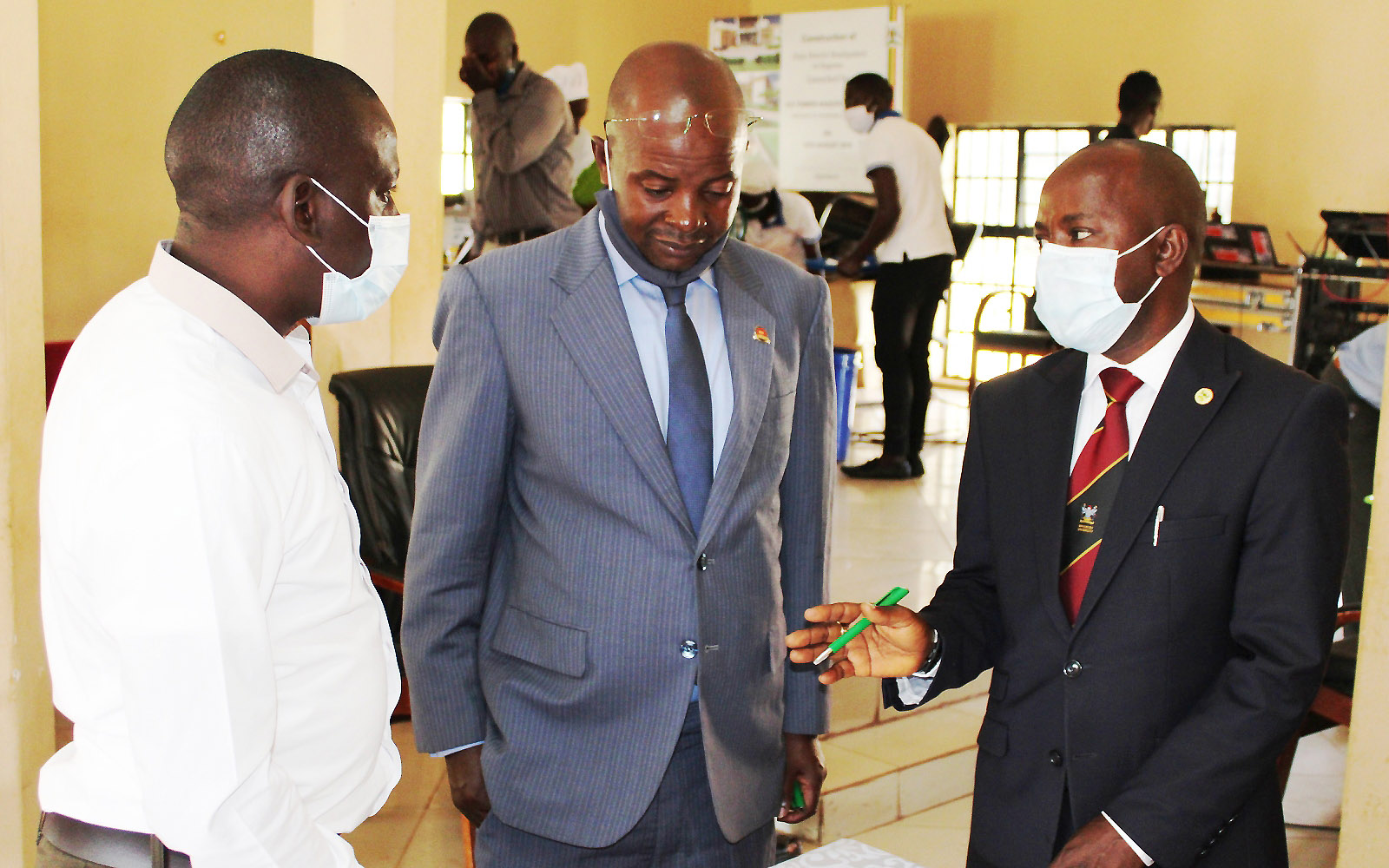
Environmental economists from the Environment for Development initiative (EfD-Mak) Centre on 26th August 2020 held a policy dialogue with Jinja District Local Government officials on the theme, “Lake Victoria’s Hydrology, Water Quality and livelihoods”.
The workshop held at the Jinja District Council Hall attracted about 40 participants including the Resident District Commissioner (RDC), Chairperson Local Council Five (LCV), District Natural Resources’ Officers, officials from the Environmental Police Unit, Civil Society Organizations and the Private sector among others.
The objective of the meeting was to discuss and brainstorm on the status of the environment more especially the rising water levels on Lake Victoria and the rivers within the district, challenges faced in the management of the natural resources and identify possible solutions to mitigate environmental degradation.
In his welcome remarks, the LCV Chairman Titus Kisambira said Jinja as an industrial district and city has had a number of environmental challenges with most of the industrialists allocated land tittles near the lake and investors encroaching on more land in the wetlands leading to adverse effects.
The Chairman said, the construction of industries in the wetlands and near the lake has affected the environmental pattern and water runways leading to overflooding and floating islands during heavy rainfall.
Mr. Kisambira reported that the district council took a decision and wrote to all industrialists asking them to vacate land allocated in the wetland. .
“The challenge was with us also, some of the industrialists would run to politicians to help them get titles but we have taken a firm decision as council and instructed the technical team like the land officers to prepare land titles that were acquired in the wetlands and those near the lake for cancelling immediately and all constructions made in the wetlands be destroyed to save the environment,
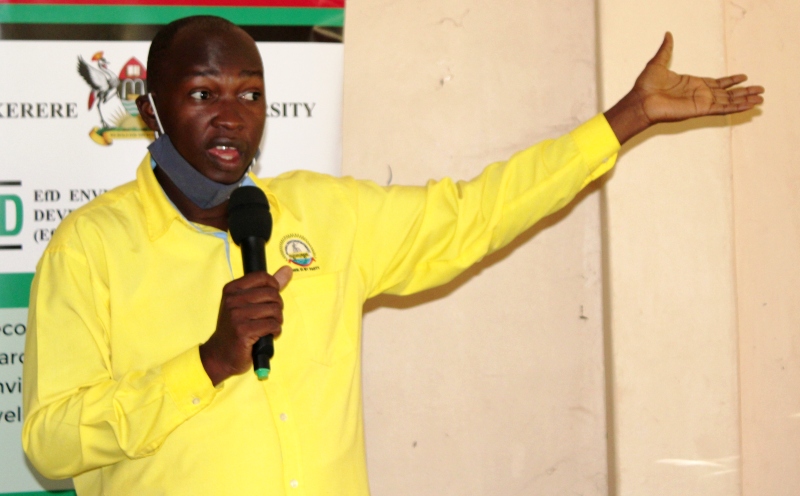
At times we are let down by the technical people in terms of implementation but for us as a council we took it as a decision that whatever was done in the wetland is reversed. We have a lot of gazzetted land which is not near the lake in Budondo, Mafubira, Busedde and Butagaya and we have advised industrialist to come and we give them land elsewhere so that they do not take away the factories but also conserve the environment”, Mr. Kisambira stated.
While opening the dialogue, the Acting RDC Lt. Alfred Musoke acknowledged that local governments were partly to blame for environmental destruction in the district..
“There are many factories near the lake now swallowed by the lake and they were constructed after acquiring the land titles yet the policy is clear that no one should get a land title in the swampy area. So people got the land titles fraudulently and the government should come in and cancel the titles because they are destroying the environmental pattern.
All districts have environmental officers and before any construction is made, there is an environmental impact assessment report. So we wonder how those reports read because if they were done properly they would not be approved.
We should revise everything and see that the environment is protected. Very many houses in the islands have been swallowed by water. Recently the President came here because of the large floating islands had been broken up and disintegrated by people and when they moved, they entered our turbines leading the entire country to experience a total blackout when the President was expected to address the nation on the COVID-19”, Lt. Musoke reported.
As a district, the RDC said environmental officers have been sensitized on their roles and the need to enforce the law.
He said recently, environmental police did patrols on landing sites where soil had been dumped and ordered perpetrators to remove the soils as they block the movement of water.
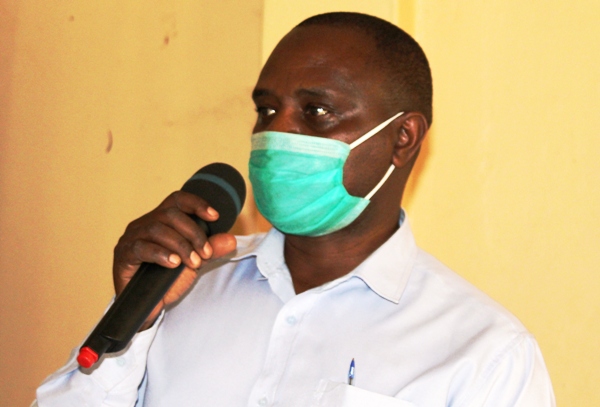
He called upon participants to openly come up to condemn environmental degraders to protect the environment.
As head of security in the district, he condemned acts of security (UPDF and police) being used to protect destroyers of the environment saying, his office was open to receive reports of such acts for immediate intervention.
Delivering the Keynote address, the Senior Environment Officer, Jinja district Mr. Maganda Moses appreciated Makerere University for this initiative saying, it was the first of its kind in Jinja that revives and brings to light a sector that is still struggling in the country in terms of budgeting and whose impact trickles down to the Local Governments and Lower Local Governments.
Mr. Maganda commended the selection of participants for the meeting on grounds that it speaks volumes on how important they are in contributing towards the existing policies on Environment and Natural Resources in the country.
Maganda said Uganda is endowed with Lake Victoria, Africa’s largest freshwater lake and the second largest in the world by surface area measuring 68,800km2, River Nile, the longest river in the world and one of the 7 wonders of the world stretching 6,650km crossing 10 countries, streams, wetlands, a beautiful landscape with Mountains, undulating hills and valleys, Minerals in different parts of the country, the oil in the Albertine region, a rich biodiversity, and a favourable climate with an annual temp. of 26 degrees Celsius.
The environmental Officer noted that Uganda has the best policies but the problem is the implementation. He called for the strengthening the institutional capacity to implement the RIO conventions, focusing on the three conventions, UNFCCC, UNCBD, UNCCCD.
“Kenya is a step ahead in implementing the three conventions, for instance being largely a desert, Kenya is shifting from the use of biomass as a source of energy and has subsidized on the costs of natural gas so that it’s affordable to all. They have also considered importing timber from neighboring countries and keeping their biomass intact.
In Kenya, the Law banning Kaveera was enacted in 2017 following a benchmark trip made by Kenya to Uganda a year before. We enacted a law on the ban of kaveera in 2009, and ever since we have been in battles with different stakeholders on the implementation of the ban, to-date it has not come to pass. On the contrary, the Kenyans are jubilating having succeeded with the ban in a space of 2 years. The manufacturers of kaveera from Kenya were actually warmly welcomed in Uganda.
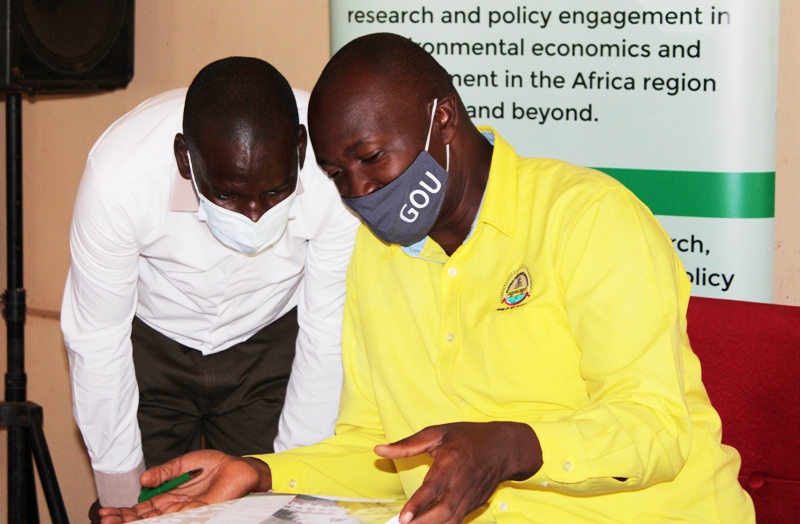
But we know how much damage kaveera can has cause on our water bodies, we know tonnes of kaveera are always harvested from Nakivuubo channel and other water channels on a daily basis and all this most likely ends up in the Lake.
In Kenya, the law on protection of wetlands, riverbanks, Lakeshores, is enforced to the dot. Most of their wetlands are intact, illegal structures on the river banks have been demolished and re-planning of such areas has taken root.” Mr. Musoke stated
He told participants that as they focus on the day’s theme, they should also focus on what their contributions have been towards the existing policies on Natural Resources, how far they have been successful, where they have failed as Government, including other stakeholders such as CSOs, Academia etc , and the possible proposals for Review where necessary.
Mr. Maganda reported that this year’s theme for celebrating World Environment Day was ‘Time for Nature, with a focus on its role in providing the essential infrastructure that supports life on Earth and human development‘, that was celebrated on the 5th of June 2020 in Colombia.
He said Uganda adopted the theme ‘Nature is speaking, Listen’, and because of the COVID-19 Pandemic, on the 5th June, 2020 an online discussion was held to celebrate the day, where the focus was on the food we eat, the air we breathe, the water we drink and the climate that makes our planet habitable, all coming from nature.
He reckoned that there would not be any other better description of the recent events that have devastated nature and humanity and threatened the livelihoods of millions of people dependent directly and indirectly on Lake Victoria than the theme itself.
The environmental officer said the volume of water in Lake Victoria has risen before and available data shows that the ever highest recorded increase was 2.5m between 1960 and 1964 though the impact to livelihoods was not as significant as it is today.
The rains that started on the 1st October 2019 he said, surpassed the last ever recorded increase and consistently went up from the 12m to the current highest level of 13.32m as of 30th April 2020.
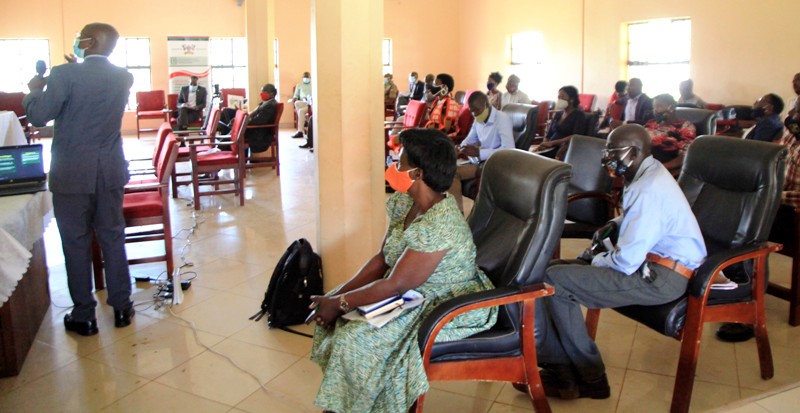
“Of course, we have seen glaring negative impacts of the rise on people’s livelihoods, settlements, animal habitats, water quality, among many others. The population explosion around the Lake Victoria basin largely accounts for this.
Today, there’s a high affinity for land along the buffer zone of Lake Victoria, there are; numerous ungazetted landing sites, unplanned settlements, industrial hubs, illegal farming activities, non-permitted recreation facilities, and unregulated sand mining activities.” He said.
Mr. Maganda attributed the rising water levels to two major causes;
He said Global Warming is the primary cause of the current water level rise (Extreme heat events experienced on earth as a result of the depletion of the ozone layer) while human activities like, charcoal burning, cutting down trees, pollution from industries, CFCs from old fridge’s, have contributed to an increase in the atmospheric concentrations of heat trapping gasses and caused the planet to warm by 1.4 degrees Fahrenheit. The rising temperatures are warming the ocean waters, which in turn expand and cause global sea level rise.
Secondly, he said are the glaciers and ice caps that are shrinking at a faster rate in response to rising temperatures adding water to the world’s oceans and in turn other water bodies.
“So where we have no direct control over such significant causes; how can we best weigh the costs and risks of accommodating the impacts; retreating from them? Or are we instead trying to defend the properties and infrastructure with protective measures.
As a country, we have clear safeguards within the existing environmental legislation; The NEA 2019 is clear on protection of fragile areas. The National Environment (Wetlands, Riverbanks and Lakeshores management) Regulations 2000 provides for the buffering of our water bodies, lakes, 200m, rivers 100m, small rivers 30m, streams 10m. Therefore, to what extent have we referred to these regulations? He asked.
At a global scale. Maganda reported that rising waters have led to destructive and devastating effects on marine habitats, erosion, wetland flooding, and agricultural soil contamination. In Jinja and most of the neighboring districts he said, Islands have either been fully or partially submerged. e.g at the source of the Nile; Agricultural land and crops have been lost; Peoples settlements have been invaded with the rising waters and forced the affected communities to migrate.and; Factories like Sunbelt, Skyfat, LIU, Agromarines, Keswhala industries have all been flooded and are counting losses.
He further observed that Recreation facilities like Rumors, Sailing club have all been flooded; Landing sites and beaches have adversely been affected by the rising waters and it this is evident in Ripon village landing site, Masese Landing site, Wanyange and Wairaka landing sites. The beach in Wairaka is no more. In addition, the breeding ground for the aquatic life washed downstream. and lastly, we had Uganda’s Hydro-electricity production dam at Nalubaale suffering a technical set back when a big mass of land moved downstream and clogged the power system leading to a total power shutdown.
Highlighting on the challenges Mr. Maganda said first, there’s need to acknowledge the fact that there’s substantial damage that has been caused on the Natural Resources and not until when they realize the mistakes made over time as a country then shall we move forward.
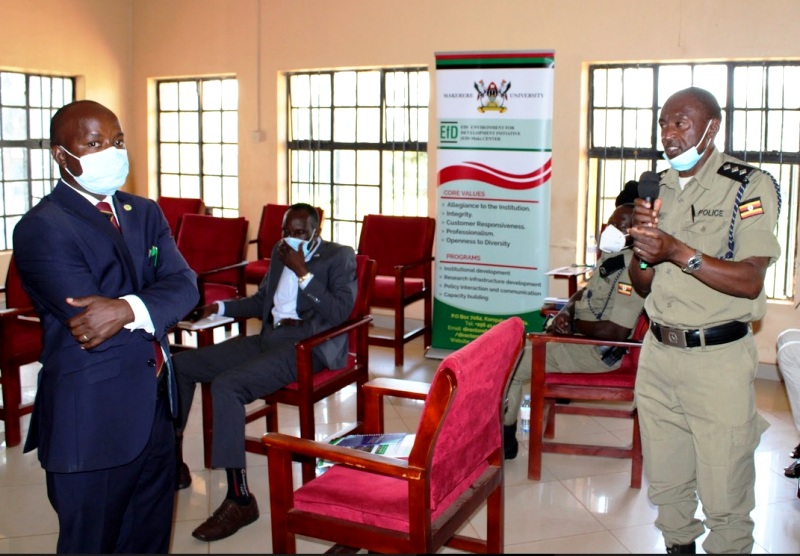
He said that there is also need to acknowledge the fact that much as there are several challenges facing the environment and natural resource sector, several strides have been made but there are many gaps in the existing policies and legislation and emerging issues like oil and gas, and these have triggered new legislation in particular to address environmental concerns for example, Review of the NEMP, in 2019 after over 15 years in existence, Review of the NEA 1995, now the NEA 2019, Presentation of the National Climate Change Bill, 2019 and now before parliament, Review of the National Wetland Policy, 2018 in a bid to safeguard the wetland resources in the country and Review of a number of Regulations in the environment sector e,g the National Environmental Audit Regulations.
He proposed the need for strong policies that will ensure that value is attached to natural resources noting that many of fringe wetlands, forests, have no economic value attached to them and this has always made it hard to convince policy makers especially at local government level to preserve these resources in the face of structural development.
He also proposed the need to ensure total respect for the fragile areas especially the River banks, Lake shores, and forest reserves siting Section 56 of the NEA 2019 refers to declaration of Special Conservation Areas in the country. The Kalagala-Itanda Offset area in Butagaya and Budondo and Kalagala on the Western and Eastern banks respectively of the Nile happens to be the first area under the Act to be declared a SCA and many more areas to be declared as so and exclusively be conserved.
The environmental officer further recommended the need to ensure strong co-ordination with other MDAs so that Environmental Concerns are clearly addressed e.g, titling of fragile areas like wetlands as purely a coordination gap with the different MDAs.
He also expressed the need to cover the gap that exists on how to prevent conversion of forest land or wetlands on private land and that anybody who owns land that has such a resource should be bound to exclusively protect it and not to convert it.
Mr. Maganda also noted that there is lack a clear and direct fund in Local governments to exclusively protect water bodies and yet local governments play a pertinent role in supervision and monitoring of compliance by the adjacent communities. He reported that LVEMP as a running project for the management of Lake Victoria and the Nile Basin Initiative that has always focused on the Nile River at policy level have played a role in empowering LLGS hence LGs need to be directly supported financially with a special fund to protect these resources.
Physical planning, he said, remains an important pillar in planning, gazetting, managing and conserving fragile areas and green spaces. The physical planning Act 2019 emphasizes taking into consideration the Environmental concerns/aspects when drawing Physical plans of particular areas. By strengthening physical planning, he noted it is possible get rid of the development scenario the country is currently embroiled in where it’s a developer to decide where to put up an industry as opposed to government planning for industrial parks or industrial hubs.
He also proposed the need to highlight and strengthen the polluter pays principle so that a developer who pollutes is responsible for paying a fee to government commensurate to the amount of pollution they have introduced into the environment. This he said is still very weak and needs to be re-emphasized.
Last but not least, the officer said there should be a deliberate mechanism at Local Government level where strict data capture, monitoring, supervision and reporting is continuously done on the activities taking place around Lake Victoria.
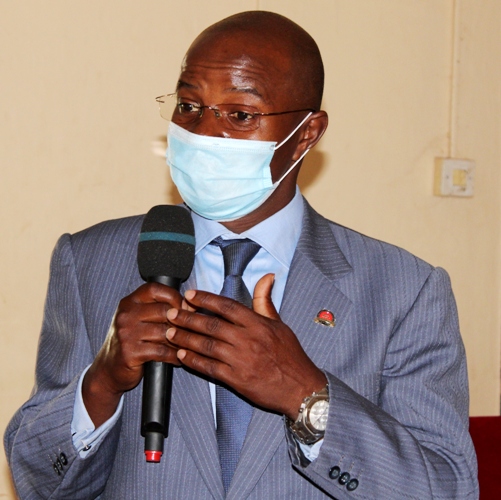
Director EfD-Mak Centre Prof Edward Bbaale said the EfD initiative is a global network of environmental economics research centre with 15 centres across the world in Chile, China, Colombia, Costa Rica, Ethiopia, Ghana, India, Kenya, Nigeria, Sweden, South Africa, Tanzania, Uganda, USA and Vietnam coordinated by the EfD Secretariat, a special Unit at the School of Business, Economics and Law, University of Gothenburg, Sweden.
Prof. Bbaale told participants that the EfD invests in policy interaction not dissemination, Creates interfaces, targets national and Local Government policy level and invests in professional staff development.
On the day’s policy interaction and the theme, Prof. Bbaale said the Lake Victoria Basin (LVB) is a critical transboundary natural resource, underpinning the economy and livelihoods of the population, acting as a waste repository and provides food, energy, irrigation, drinking water, tourism and transportation to the economy.
He said that being the source of the White Nile, the lake also supports the livelihoods of Egypt, Sudan and South Sudan and is the primary modulator of the region’s climate. Despite its importance, Prof. Bbaale said, the LVB has undergone intense environmental degradation for decades, resulting in significant ecological and economic challenges.
He highlighted that rapid population growth, agricultural expansion, urbanization, and industrialization have mounted extreme pressure on the lake and its basin’s ecosystems leading to the degradation of lands, and the loss of wetlands and forests.
Speaking on human activities and degradation the director said insufficient monitoring and weak enforcement of regulations on illegal- and over-fishing activities have reduced fish stocks, which threaten crucial livelihoods and food security among others.
“Climate change has also affected the basin as temperatures have consistently increased between 0.1°C and 2.5°C, based on historical data from 1920 to 2013. The LVB and its inhabitants are vulnerable to the increasing effects of climate shocks, which would likely exacerbate its environmental problems.” Prof. Bbaale reported
He said, water levels in the Lake are influenced by direct rainfall over the lake, runoff from the basin, evaporation from the Lake, and outflows into the Nile, the latter of which is currently controlled by more than one hydropower dam.
The fish stocks according to Prof. Bbaale are threatened by climate change due to warmer waters and pollution induced changes in water quality while increased rainfall increases erosion due to the farming close to the shores and pollution, directly impact the lake’s water quality.
The changing temperatures according to the Director, introduce disease vectors and increase the risk of malaria and other vector-borne diseases for the basin’s human population and that during the period of late January 2020, the effect of Lake Victoria bursting its banks started to be felt with several landing sites and settlements damaged by floods.
This, the professor notedhas left almost half a million people homeless and property worth billions of money had been lost in Uganda, Kenya and Tanzania.
Prof. Bbaale attributed Lake Victoria’s Hydrology change to mainly three causes namely Climate change, lack of regional consensus on a well-coordinated policy of regulating Lake Victoria inflow and outflow and Lake Sedimentation due to catchment degradation and Buffer zone encroachment.
On livelihood impacts of changes in Lake Victoria Eco-system. Prof. Bbaale said there is declining fish biomass, catch and exports, impact on infrastructure especially the Hydropower generation, water transport and reduced business activity along the landing sites, poverty and unemployment plus high crime risks.
Report compiled by: Jane Anyango, Communication Officer, CAES
You may like
General
Over 9,200 to graduate at Makerere University’s 76th Graduation
Published
5 hours agoon
February 24, 2026
Pomp and colour defined the opening day of the Makerere University’s 76th Graduation Ceremony as thousands gathered to celebrate academic excellence and new beginnings.
The historic ceremony has brought together scholars, families, friends and industry partners in a vibrant celebration of achievement and possibility. Throughout the four-day event, the University will confer degrees and award diplomas to 9,295 graduands in recognition of their dedication and hard work.
Among the graduates, 213 will receive Doctor of Philosophy (PhD) degrees, 2,503 will graduate with Master’s degrees, and 6,343 will earn Bachelor’s degrees. In addition, 206 students will graduate with postgraduate diplomas, while 30 will be awarded undergraduate diplomas.
Of the total number of graduands, 4,262 are female and 5,033 are male. According to Vice Chancellor, this marks the first time in 15 years that male graduands have outnumbered their female counterparts.
The best overall graduand in the Sciences, Esther Ziribaggwa, graduated on the opening day with the Bachelor of Agricultural and Rural Innovation and an impressive Cumulative Grade Point Average (CGPA) of 4.77.

The ceremony marks a proud moment for Makerere University as it continues to nurture top-tier professionals across diverse fields.
While presiding over the graduation, the State Minister for Primary Education, Hon. Dr. Joyce Moriku Kaducu, on behalf of the First Lady and Minister of Education and Sports, Hon. Janet Kataaha Museveni, pointed out that Makerere University is a model institution, where leaders are nurtured, scholars are sharpened, and where dreams have been given direction.
In her address, Hon. Museveni, highlighted Government’s deliberate investment in research, innovation, and infrastructure to strengthen higher education in Uganda.
“The establishment of the Makerere University Research and Innovation Fund (RIF), supports high-impact research and innovation that directly contributes to national priorities and development. Through this initiative, thousands of researchers and innovators have pursued practical, scalable solutions that are transforming communities and key sectors across Uganda,” Mrs Museveni, said.
The Minister also noted that Parliament’s approved a USD 162 million concessional loan to upgrade science, technology, and innovation infrastructure at Makerere University. The funding will facilitate the construction of modern laboratories, smart classrooms, and state-of-the-art facilities for Engineering and Health Sciences, investments expected to position the University firmly within the Fourth Industrial Revolution.
“Government has embarked on the construction of a National Stadium at Makerere University and other institutions of higher learning across the country. This will promote physical education, strengthen talent identification, and boost investment in the sports sector,”

Turning to the graduands, the Minister encouraged them to see themselves not merely as job seekers, but as job creators and solution-makers.
Uganda and Africa need innovators who will modernize agriculture; engineers who will build quality infrastructure; healthcare professionals who will strengthen health systems; and educators who will inspire the next generation,” the Honourable Minister said.
She reminded graduates that they are entering a rapidly changing world shaped by Artificial Intelligence, climate change, and shifting global markets. To thrive, she advised them to remain adaptable, creative, and committed to lifelong learning.
She also encouraged graduates interested in entrepreneurship to tap into the Government’s Parish Development Model, which provides community-based financing and production support.
Quoting Proverbs 3:5–6, the Minister urged the graduates to trust in God as they embark on their next chapter.
She extended special appreciation to the Mastercard Foundation for its 13-year partnership with Makerere University in expanding access to education and empowering young people in Uganda and beyond.
In his speech, the Chancellor of Makerere University, Dr Crispus Kiyonga, urged graduands to harness research, innovation and technology to drive Uganda’s transformation.

“This is a milestone in your lives. You have invested time, discipline and hard work to attain these qualifications. It is important that you derive value from this achievement, not only for yourselves, but for your families and for society.” Dr Kiyonga, said.
Dr. Kiyonga expressed gratitude to the Government of Uganda for its continued financial support to the University, particularly the funding allocated under MakRIF, which he described as critical in strengthening the institution’s research capacity.
“Research plays a very vital role in the development of any community. Makerere as the oldest University in the country is doing a significant amount of research, However, more work is required to mobilize additional resources to further strengthen research at the University.” Dr Kiyonga, noted.
Acknowledging the challenges of a competitive job market, Dr. Kiyonga encouraged graduates to think beyond traditional employment pathways.
“It is true that the job market may not absorb all of you immediately. But the knowledge you have acquired is empowering. You can create work for yourselves, individually or in teams.” Dr Kiyonga, said.
He advised the graduands to embrace discipline, integrity and adaptability in the workplace, and to take advantage of technology and digital platforms to innovate and respond to societal challenges.
“Every development challenge presents an opportunity. Believe that you can apply your knowledge to create solutions with impact.” He said.
Addressing the congregation, the Vice Chancellor, Prof Barnabas Nawangwe, congratulated the graduands, particularly staff and societal leaders on their respective achievements.

“I congratulate all our graduands upon reaching this milestone. In a special way I congratulate the members of staff, Ministers, and Members of Parliament that are graduating today as well as children and spouses of members of staff,” Prof Nawangwe, said.
In his speech, Prof Nawangwe, recognized outstanding PhD students, particularly members of staff. who completed their PhDs in record time without even taking leave from their duties.
He called upon graduates not to despise humble beginnings but rather reflect on the immense opportunities around them and rise to the occasion as entrepreneurs.
“You are all graduating with disciplines that are needed by society. We have equipped you with the knowledge and skills that will make you employable or create your own businesses and employ others. Do not despair if you cannot find employment. Instead, reflect on the immense opportunities around you and rise to the occasion as an entrepreneur,” Prof Nawangwe, said.
Prof Nawangwe called upon the graduands of PhDs to use their degrees to transform the African continent.
“As you leave the gates of Makerere I urge you to put to good use the knowledge you have received from one of the best universities in the World to improve yourselves, your families, your communities, your Country and humanity. Let people see you and know that you are a Makerere alumnus because of the way you carry yourself in society with dignity and integrity. Put your trust in God and honour your parents and opportunities will be opened for you,” Prof Nawangwe, said.
Delivering a key note address, Prof. Nicholas Ozor, the Executive Director of the African Technology Policy Studies Network Nairobi, Kenya ((ATPS). Reminded the graduates that a degree is not a finish line but the beginning of accountability. “The world is a complex, fast changing and deeply unequal. Degrees make you responsible for others not better than them,” Prof Ozor, said.

The 76th Graduation Ceremony of Makerere University will be held from Tuesday 24th to Friday 27th February, 2026. A total of 213 PhDs (87 female, 126 male), 2,503 Masters (1,087 female, 1,416 male), 206 Postgraduate Diplomas (80 female, 126 male), 6,343 Undergraduate Degrees (2,999 female, 3,344 male), and 30 Undergraduate Diplomas (9 female, 21 male) will be graduating from all the Colleges.
Ms. Sarah Aloyo and Ms. Nakato Dorothy both students of the Bachelor of Procurement and Supply Chain Management emerged as the best in the Humanities and Best Overall students with a CGPA of 4.93. Mr. Ssewalu Abdul, a Bachelor of Leisure and Hospitality Management student emerged second best in the Humanities with a CGPA 4.90. Ms. Esther Ziribaggwa emerged as the best student in the Sciences with a CGPA of 4.77 in the Bachelor of Agricultural and Rural Innovation, while Mr. Simon Mungudit emerged second best in the Sciences with a CGPA of 4.76 in the Bachelor of Science in Petroleum Geoscience and Production.
Commencement Speakers
- Day 1 – Prof. Nicholas Ozor, the Executive Director of the African Technology Policy Studies Network, Nairobi, Kenya
- Day 2 – Prof. Dr. Maggie Kigozi, Chairperson Makerere University Endowment Fund Board
- Day 3 – Dr. Patricia Adongo Ojangole, Managing Director, Uganda Development Bank Limited
- Day 4 – Ms. Reeta Roy, Former President & Chief Executive Officer, Mastercard Foundation
The 76th Graduation Ceremony will be held at the Freedom Square following the schedule below:
Tuesday, 24th February, 2026
College of Agricultural and Environmental Sciences (CAES)
College of Computing and Information Sciences (CoCIS)
College of Education and External Studies (CEES)
School of Law (SoL)
Livestream Link for Day 1: https://youtube.com/live/wVGPA0FJ9pU
Wednesday, 25th February, 2026
College of Health Sciences (CHS)
College of Natural Sciences (CoNAS)
College of Veterinary Medicine, Animal Resources and Bio-security (CoVAB)
School of Public Health (SPH)
Thursday, 26th February, 2026
Makerere University Business School (MUBS)
College of Business and Management Sciences (CoBAMS)
Friday, 27th February, 2026
College of Engineering, Design, Art and Technology (CEDAT)
College of Humanities and Social Sciences (CHUSS)
Institute of Gender and Development Studies (IGDS)
Makerere Institute of Social Research (MISR)
General
Mak Selected to Host Alliance for African Partnership Africa Office
Published
1 day agoon
February 23, 2026
Makerere University has been selected to host the Africa Office of the Alliance for African Partnership (AAP). The significant milestone that underscores Makerere’s role in fostering research, innovation, and global collaborations across the continent was announced at a meeting of the University’s Central Management with an AAP delegation on 23rd February 2026.
Makerere’s selection was based on the University’s robust commitment, alignment with the AAP’s Strategic Plan, and proven ability to manage consortium activities. The AAP, which was initiated by Michigan State University (MSU) in collaboration with Ten African Universities and agricultural policy research networks in 2016, targets critical challenges in education, youth empowerment, health and nutrition, agri-food systems, science and technology, water, energy, environment, and culture and society.
Addressing the delegation consisting of AAP Co-Directors from MSU, Dr. Jose Jackson-Malete and Dr. Amy Jamison, accompanied by newly-appointed Director of the AAP Africa Office, Dr. Racheal Ddungu Mugabi and Ms. Clare Cheromoi, the Vice Chancellor, Prof. Barnabas Nawangwe who appreciated the choice of Makerere to host the Africa Office said:
“One of the greatest challenges facing African universities is PhD training, particularly supervisory capacity. Through partnerships such as the Alliance for African Partnership we can leverage international expertise to strengthen supervision—whether through training supervisors or through joint supervision arrangements.”
Prof. Nawangwe equally applauded joint initiatives such as the Grant Writing and Publication project, which gave rise to the establishment of a Writing Centre that he said can be used to build capacity in AAP member universities with Makerere as the hub. Officially launched on 21st March 2023, the project is living up to its expectation of becoming a springboard for strong postdoctoral collaborative research for both institutions and other US universities.
Dr. Titus Awokuse, Vice Provost and Dean for International Studies and Programs at Michigan State University (MSU) who attended virtually, reiterated that Makerere’s selection reflects its long-standing commitment to advancing African higher education, research excellence, and meaningful global collaboration.
Reflecting on the origins of the Alliance for African Partnerships (AAP), Dr. Awokuse explained that nearly a decade ago, MSU initiated a transformative conversation in Atlanta centered on the question: How should we partner differently? From this dialogue emerged AAP—an Africa-centered consortium that now brings together 12 institutions across Africa and the United States.

He emphasized that AAP is grounded in equity, mutual benefit, shared leadership, and deep respect for African priorities and expertise. Since its founding, MSU has served as convener and key supporter, working with member institutions to strengthen research collaboration, promote faculty and student engagement, and address shared development priorities.
Dr. Awokuse underscored that AAP’s success is the result of collective vision and commitment, not the efforts of a single institution. He paid tribute to Lilongwe University of Agriculture and Natural Resources for hosting the Africa Office in its early years and acknowledged the foundational leadership of the inaugural Africa Office Director.
He described the launch of the Africa Office at Makerere University as a significant milestone that reinforces Africa-led leadership, strengthens regional collaboration, and enhances responsiveness to emerging opportunities. MSU, he affirmed, remains fully committed to AAP and to working closely with Makerere and all consortium partners to expand collaborative research, nurture the next generation of scholars, and advance Africa-led solutions to global challenges.
The newly-appointed AAP Africa Office Director, Dr. Racheal Ddungu Mugabi is a member of faculty in the Department of Development Studies, Institute of Gender and Development Studies. Her work on intersectional inequalities in Uganda and other Global South regions uniquely positions her to drive collaborative research and partnerships at the Africa Office.
Initially founded by ten African Universities and MSU, AAP now comprises eleven African members including; the African Network of Agricultural Policy Institutes (ANAPRI)-Zambia, Egerton University-Kenya, Lilongwe University of Agriculture and Natural Resources (LUANAR)-Malawi, Makerere University-Uganda, United States International University-Africa-Kenya, Universite Cheikh Anta Diop-Senegal, Universite Yambo Ouologuem de Bamako-Mali, University of Botswana-Botswana, University of Dar es Salaam-Tanzania, University of Nigeria, Nsukka-Nigeria, and the latest, University of Pretoria-South Africa.
These Universites collaborate under Focal Points to advance policy-relevant research and sustainable development. Makerere University’s Focal Point is Prof. Robert Wamala, Director of Research, Innovations and Partnerships (DRIP).
Addressing the University Management, Dr. Jackson-Malete outlined the African Futures Research Leadership Program, which nurtures early career scholars through mentorship and skill-building as one of AAP’s flagship programs. She noted that the Program that prioritizes female participants or men committed to promoting women in higher education has for the first time during its fifth cohort admitted the first male, Dr. Alfadaniels Mabingo from the Department of Performing Arts and Film, Makerere University.
The AAP Africa Office at Makerere will coordinate activities, boost research collaboration, mobilize resources, and enhance global engagements for socio-economic transformation. This aligns with Makerere‘s broader goals of leveraging international expertise to build resilient institutions.
View more photos from the event: https://flic.kr/s/aHBqjCLjoA
Trending
-

 Humanities & Social Sciences2 days ago
Humanities & Social Sciences2 days agoMeet Najjuka Whitney, The Girl Who Missed Law and Found Her Voice
-

 Health6 days ago
Health6 days agoUganda has until 2030 to end Open Defecation as Ntaro’s PhD Examines Kabale’s Progress
-

 Agriculture & Environment5 days ago
Agriculture & Environment5 days agoUganda Martyrs Namugongo Students Turn Organic Waste into Soap in an Innovative School Project on Sustainable Waste Management
-

 General6 days ago
General6 days agoMastercard Foundation Scholars embrace and honour their rich cultural diversity
-

 Health2 weeks ago
Health2 weeks agoCall for Applications: Short Course in Molecular Diagnostics March 2026
